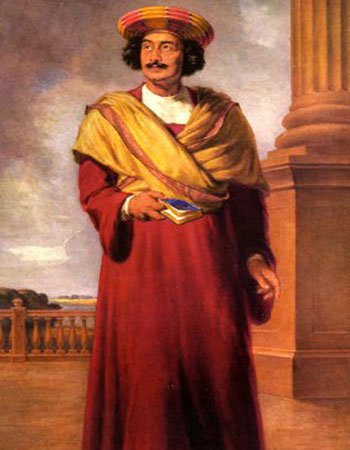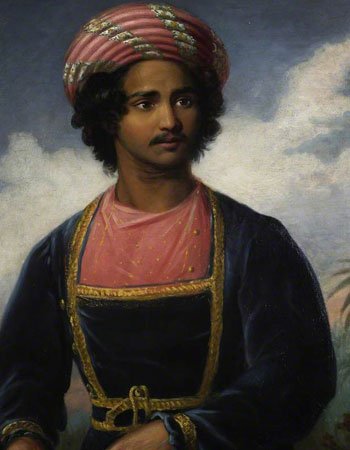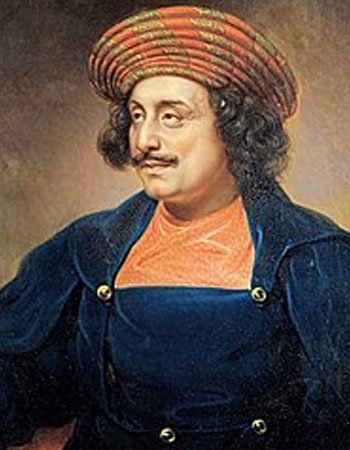Raja Ram Mohan Roy, FRAS, was an Indian reformer who played a pivotal role in the founding of the Brahmo Sabha in 1828, which eventually evolved into the Brahmo Samaj, a significant social-religious reform movement in the Indian subcontinent. One of his most notable accomplishments was the abolition of the cruel and inhumane practice of Sati. He was a staunch advocate for various causes, including education, women’s rights, widow remarriage, and the eradication of Sati, where widows were forced to self-immolate on their husband’s funeral pyres. His ideals encompassed individualism, material liberation, self-expression, and the promotion of a more stable economic system. Additionally, he seized the opportunity to learn languages such as Hebrew, Greek, Latin, and English. In this article, you’ll find a comprehensive Raja Ram Mohan Roy biography.
Raja Ram Mohan Roy Biography Age, Education, Family, Career, Net Worth, and More
Raja Ram Mohan Roy embarked on a journey that took him through the Himalayas and led him to Tibet. The book “Rammohan Roy: The First Liberal of India” by Ramachandra Guha provides valuable insights into the thoughts and ideas of Raja Ram Mohan Roy. Given his unique upbringing in a family that embraced religious diversity, which was quite unusual in Bengal at the time, it’s not surprising that the young Ram Mohan Roy became deeply troubled by the societal issues arising from religious and social malpractices.
Early Age
Raja Ram Mohan Roy was born on August 14, 1774, to Ramakanta Roy and Tarini Devi in the village of Radhanagar in the Hoogly district of the Bengal Presidency. If we calculate his age based on that birthdate, he would be 249 years old today. However, it’s important to note that he passed away on September 27, 1833, so he is no longer alive.
Family
Ram Mohan Roy’s birthplace was Radhanagar in the Hooghly District of Bengal Presidency. His father was a wealthy Brahmin who adhered strictly to orthodox religious practices and duties. In his family’s lineage, his great-grandfather, Krishnaanta Bandyopadhyay, held the esteemed status of a Rarhi Kulin Brahmin. In keeping with the customs of the era, Ram Mohan Roy entered into a child marriage at the tender age of nine. However, tragically, his first wife passed away shortly after their marriage. His mother, Tarini Devi, hailed from a Shaivite family, bringing a different religious perspective into his upbringing.

Raja Ram Mohan Roy Father Pic

Raja Ram Mohan Roy Childhood Pic
Education
Roy dedicated himself to promoting the advantages of modern education among the general populace. During this period, India grappled with various socio-economic and political challenges, leading to turmoil often associated with religious divisions. In 1817, he collaborated with David Hare in establishing the Hindu College, providing educational opportunities. His early education encompassed Sanskrit and Bengali at a village school, followed by studies in Persian and Arabic at a Madrasa in Patna. He played a pivotal role alongside Rev. Alexander Duff in the establishment of the Scottish Church College, formerly known as “The General Assembly Institution,” in 1830, elevating it to one of the prestigious institutions in Calcutta (now Kolkata). Subsequently; he journeyed to Kashi to delve into the intricacies of Sanskrit and Hindu scriptures such as the Vedas and Upanishads. Roy championed the cause of Western education, leading to significant advancements in education in India.
Height and Weight
Raja Ram Mohan Roy’s height was approximately 1.75 meters, and his weight was around 56 kilograms.
Wife and Children
Ram Mohan Roy’s life indeed included three marriages. His second marriage occurred when he was just ten years old, resulting in two sons from that union. He had two sons, Radhaprasad, born in 1800, and Ramaprasad, born in 1812, from his second wife. Unfortunately, his second wife passed away in 1824.
Later Life
Rammohan Roy grew up to be a socially conscious individual deeply troubled by the societal malpractices he observed. After completing his education, he secured employment with the East India Company, where he served for several years and eventually attained the position of revenue officer in 1809. Initially, Roy earned a living through various means, including moneylending, managing his modest estates, and trading in British East India Company Bonds. In 1805, he was hired by John Digby, a junior company officer who introduced Roy to Western literature and culture. Over the following decade, Roy worked as Digby’s assistant, intermittently employed by the British East India Company. During this time, he voiced his dissent against unjust British actions in India. Ram Mohan held a strong belief in Lord Vishnu and is even credited with coining the term “Hinduism.”
Death
In 1830, Raja Ram Mohan Roy embarked on a journey to England with the objective of appealing to the Imperial Government. His primary goals were to advocate for an increase in the royalty received by the Mughal Emperor and to ensure the preservation of Lord Bentinck’s Sati Act, preventing its overturning.
Legacy
Ram Mohan Roy viewed education as a potent tool for driving social reforms. In 1815, he relocated to Calcutta, where he took a momentous step in 1816 by establishing an English College using his own savings. His fervent dedication to English education and ideas sparked a notable debate between two prominent figures, Mahatma Gandhi and Rabindranath Tagore. Raja Ram Mohan Roy was a strong advocate for students to acquire knowledge of the English language and scientific subjects. He criticized the government’s policy of exclusively establishing Sanskrit schools. Gandhi, however, disagreed with Roy’s emphasis on English education and Western thought, fearing that it hindered independent thinking and stifled traditional Indian values. Gandhi believed that learning modern subjects like Mathematics, Geography, and Latin was essential for India’s progress. Tagore, in contrast, wrote a letter rejecting Gandhi’s viewpoint, highlighting that Ram Mohan Roy possessed a profound understanding of Indian wisdom.
Net Worth
As of June 1, 2023, Ram’s estimated net worth is approximately $5 million.
Description |
Years |
| Raja Ram Mohan Roy died of meningitis on 27 September 1833 in England | 1833 |
| As an ambassador of the Mughal Emperor Akbar Shah II, who bestowed upon him the title of “Raja” to the court of King William IV, he traveled to England. | 1830 |
| History of Indian Philosophy, The Universal Religion | 1829 |
| Brahmo Sabha, which was later renamed Brahmo Samaj, was founded in 1828 by Raja Ram Mohan Roy. | 1828 |
| Bengali Grammar | 1826 |
| The Anglo-Hindu school and Vedanta College were founded by Roy in 1826, and he desired that his monotheistic views be combined with a “modern, western curriculum.” | 1822 |
| The Precepts of Jesus- The Guide to Peace and Happiness, A Defence of Hindu Theism | 1820 |
| Mundaka Upanishad | 1819 |
| A Conference between the Advocate for, and an Opponent of the Practice of Burning Widows Alive (Bengali and English) | 1818 |
| Raja Ram Mohan Roy and David Hare collaborated to establish the Hindu College in Calcutta. | 1817 |
| Kathopanishad | 1817 |
| Kenopanishads, Translation of an abridgment of the Vedanta Sara, Ishopanishad
|
1816 |
| Vedanta Gantha | 1815 |
| To devote his life to religious, social, and political changes, he quit his work and relocated to Calcutta. | 1814 |
| Tuhfat-ul-Muwahhidin | 1804 |
Physical Appearance
His height is 5 feet and 7 inches and his weight is 56kg.
Favourite
| Color | Orange, Purple |
| Food | Chaat |
| Drink | Thandai |
| Actor/Actress | Pooja Hegde (Telugu cinema) |
| Songs | Apna Bana Le |
| Movies | Lagaan |
| Hobbies | Paint |
Also Check: Sarojini Naidu
| Body Measurements | Chest: 38 |
| Birth Place | Radhanagar, Bengal |
| Children | 2 |
| Eye Color | Black |
| Hair Color | Black |
| Height In CM | 175 CM |
| Height In Meter | 1.75 M |
| Nationality | Indian |
| Parents | Father: Ramkanta Roy Mother: Tarinidevi |
| Profession | Social workers work with adults |
| Siblings | N/A |
| Spous | Devi Uma |
| Weight | 56kg |
| Zodiac Sign | Gemini |
Comments
If you have any question, please write below.

Enter your comment!